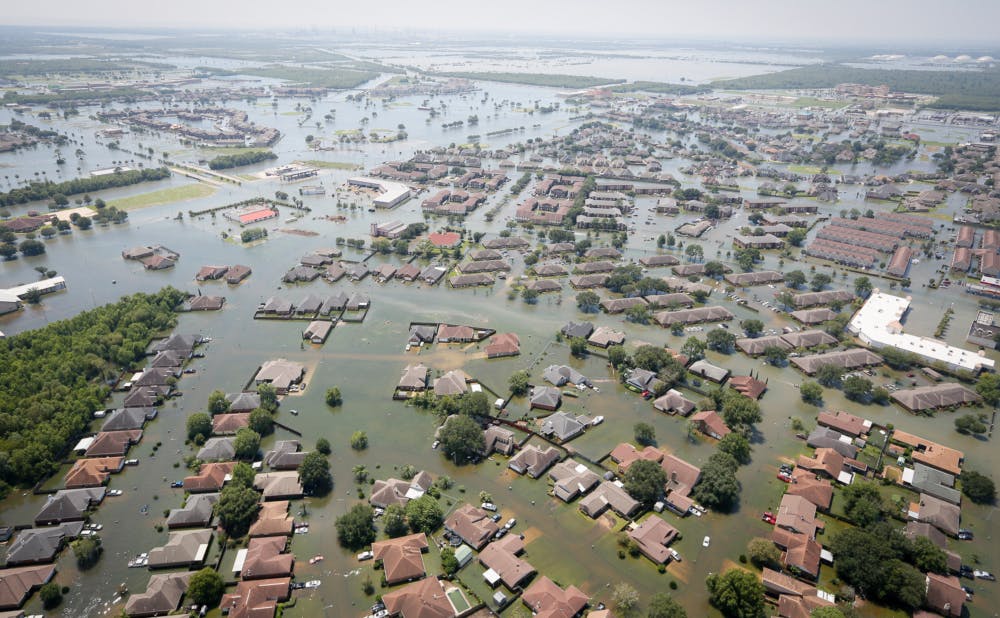As another hurricane is likely narrowly missing Durham right now, I'd like to take one last breath to discuss the hurricane that I escaped back in my hometown a few weeks ago. After Hurricane Harvey brought a year's worth of rainfall to Houston in but a few days, there’s a significant amount of infrastructure that needs to be repaired or replaced ($40 billion worth, by some estimates).
But of all the infrastructure that is being fixed, one particularly noteworthy aspect is public education. Schools were supposed to start in Houston the week the storm hit for 215,000 students. Now, start dates have been pushed back by two weeks or more (for my former high school, three weeks).
More incredible than the quick turnaround time are the longer-lasting changes benefiting the students for the rest of school year. An NPR piece notes that the superintendent has been designing more “community schools,” or rather, “public schools with a particular mission to identify student and family needs for housing, health care, jobs, food and mental health, and to address those needs through partnerships with community-based nonprofits, government agencies and businesses.”
Additionally, every student is eligible for free breakfast and lunch for the rest of the year—in a city where the school district is already the biggest food distributor. People recognize that learning can’t happen on an empty stomach, especially in a district where 75% of the population is classified as economically disadvantaged.
This change strikes close to home as I remember collecting stories from a wide range of my peers in high school, from a broad variety of schools and backgrounds. I repeatedly heard lines such as, "I don't feel comfortable talking to any adult at this school. My teachers give me grades, so that's awkward. My counselor has hundreds of students, and I only bother them when I have issues with my schedule, so that's weird. Aside from that, there's no social worker, and no other adult to go to.” These comments were accompanied by narratives of circumstances outside the classroom that made learning difficult.
NPR notes that after Hurricane Katrina, many public schools formerly run by the district were replaced with charter schools, many of which brought in outside teachers. They enforced a "no excuses model" of harsh discipline, failing to grasp that this approach can accentuate the negative effects of trauma on students.
This is neither a political statement for or against charters, nor one against any type of school in general, as the circumstances in New Orleans and Houston are very different. But it is interesting to compare different approaches to dealing with a traumatic situation—to note whether a place maintains the existing but damaged infrastructure (the same schools, same teachers, and relies upon the same community to address the problem), or whether everything gets replaced by new, external infrastructure.
Houston’s newly available resources and opportunities are framed as innovative and regarded as valuable, yet the presence of similar initiatives are the status quo at Duke. It is routinely and widely publicized at Duke that services are available to those who need them. In reference to Hurricane Harvey, which hit hundreds of miles away from Duke’s campus, L-Mo's first email of the year noted that CAPS was available for counseling for those who needed support. His most recent email included a link to the ways that one can help in the context of Harvey.
But recognizing these non-academic needs as a priority in Houston—and many other large, urban, public school districts—where money and standardized test scores are always a concern, especially in this political environment, gives me hope that education can be recognized as a priority not above emotional and social well-being, but alongside it.
Even if there is a stigma that shouldn't exist around using these mental and emotional resources at Duke, the fact that they exist in the first place is a luxury in comparison to other places. If Duke decided to get rid of CAPS all of a sudden, there would be tremendous backlash from students, especially given the other amenities our tuition covers (like Duke's grass).
I recognize that resources are much more accessible to Duke than Houston, while also acknowledging that both communities are both fantastic, loving, places that I call home.
My memories of the last hurricane that hit Houston (Hurricane Ike, in 5th grade) mostly revolve around the quiet week without electricity after the hurricane tore through the city. Without air conditioning in a muggy September, I remember my family inviting neighbors to eat food that would otherwise spoil in our fridge, playing Monopoly and talking late into the night by the light of a gas lamp. I remember going to friends’ houses whose electricity was restored, cheering on friends as they got their power back, and spending significant time at the pool and the public library. And for a couple of moments, my community and my neighborhood felt just a bit stronger.
Amy Fan is a Trinity sophomore. Her column, "fangirling," runs on alternate Wednesdays.
Get The Chronicle straight to your inbox
Sign up for our weekly newsletter. Cancel at any time.

Amy Fan is a Trinity senior. Her column, "fangirling," runs on alternate Thursdays.

